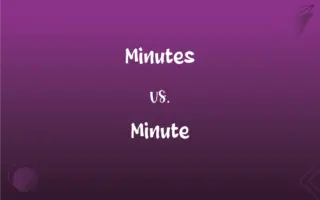Rules vs. Policies: What's the Difference?
Edited by Aimie Carlson || By Harlon Moss || Published on November 14, 2023
Rules are specific prescriptions for actions, while policies are broad guidelines for decision-making.

Key Differences
Rules are concrete directives that dictate specific actions or behaviors, ensuring consistency and predictability. Policies, on the other hand, are general statements or guidelines that help in making decisions.
Rules often have clear consequences for non-compliance, directly affecting individual behavior. Policies provide a framework but may offer more discretion in their application.
Rules typically offer little room for interpretation and are often rigid in nature. Policies, conversely, may allow for some flexibility and interpretation based on the situation.
While rules are designed to be followed without deviation, policies often serve as a foundation upon which specific rules or procedures are developed.
In many settings, rules emerge from underlying policies. The policy sets the general direction, while rules provide the detailed steps to achieve the policy's objectives.
ADVERTISEMENT
Comparison Chart
Nature
Concrete and specific
Broad and general
Flexibility
Rigid with little room for interpretation
May allow some interpretation
Origin
Often derived from policies
Can serve as a foundation for rules
Application
Directly affect individual behaviors
Provide a framework for decision-making
Consequences
Typically have clear repercussions for non-compliance
May or may not have direct consequences for non-adherence
ADVERTISEMENT
Rules and Policies Definitions
Rules
Ensure consistency and order.
Traffic rules prevent chaos on the roads.
Policies
Principles driving strategies and procedures.
Their return policy is customer-friendly and hassle-free.
Rules
Set standards for operations.
The club has rules about member conduct.
Policies
General guidelines for decision-making.
The company's environmental policies prioritize sustainability.
Rules
Establish boundaries and limitations.
The rules stated that no outside food is allowed in the theater.
Policies
Aid in achieving broader objectives or missions.
The university's policies aim to promote inclusive education.
Rules
Prescribed directives for behavior.
The rules of the game require each player to take turns.
Policies
High-level statements reflecting values or stance.
Their privacy policy ensures data protection for all users.
Rules
Offer specifics on what is permissible.
The school's rules dictate the required uniform.
Policies
Frameworks setting an organization's direction.
The government's foreign policies guide international relations.
Rules
Governing power or its possession or use; authority.
Policies
A plan or course of action, as of a government, political party, or business, intended to influence and determine decisions, actions, and other matters
American foreign policy.
The company's personnel policy.
Rules
The duration of such power.
FAQs
What are rules?
Rules are specific directives or prescriptions governing behavior or actions.
Are rules rigid?
Typically, rules are more rigid and offer little room for interpretation.
Which offers more flexibility: rules or policies?
Policies generally offer more flexibility than rules.
What are policies?
Policies are broad guidelines or principles that aid in decision-making.
Which is typically more detailed, rules or policies?
Rules are usually more detailed, providing specific directives.
How often should rules and policies be reviewed?
Regularly, to ensure they remain relevant, effective, and align with changing objectives or environments.
Can an organization have policies without specific rules?
Yes, an organization can have policies that provide direction without dictating specific rules.
Is it necessary for a rule to align with a policy?
Ideally, rules should align with and support the objectives of underlying policies.
Who ensures compliance with rules?
Various entities, like supervisors, regulators, or referees, may oversee rule compliance.
Can rules and policies vary across cultures or countries?
Yes, what's acceptable or standard in one culture or country might differ in another, leading to varying rules and policies.
Can rules be derived from policies?
Yes, often specific rules emerge from broader policies to detail implementation.
Can policies change over time?
Yes, policies can evolve based on changing needs, values, or objectives.
Who usually sets policies?
Policies are often set by top management, governing bodies, or legislators.
Why are policies essential for an organization?
Policies provide direction, reflect the organization's values, and aid in consistent decision-making.
Do policies always have clear consequences like rules?
Not always; while policies provide a framework, they might not always stipulate direct consequences.
Why are rules important?
Rules ensure consistency, order, and predictability in operations and behaviors.
Can rules conflict with policies?
Ideally, they shouldn't, but if poorly formulated, rules might not align with overarching policies.
Which comes first when establishing a new system: rules or policies?
Typically, policies come first to provide direction, followed by rules for implementation.
Do policies always lead to the creation of rules?
Not always, but policies can serve as a foundation upon which rules are developed.
Can an individual set rules and policies?
While individuals can set personal rules or guidelines, organizational policies are typically set by higher authorities or consensus.
About Author
Written by
Harlon MossHarlon is a seasoned quality moderator and accomplished content writer for Difference Wiki. An alumnus of the prestigious University of California, he earned his degree in Computer Science. Leveraging his academic background, Harlon brings a meticulous and informed perspective to his work, ensuring content accuracy and excellence.
Edited by
Aimie CarlsonAimie Carlson, holding a master's degree in English literature, is a fervent English language enthusiast. She lends her writing talents to Difference Wiki, a prominent website that specializes in comparisons, offering readers insightful analyses that both captivate and inform.































































